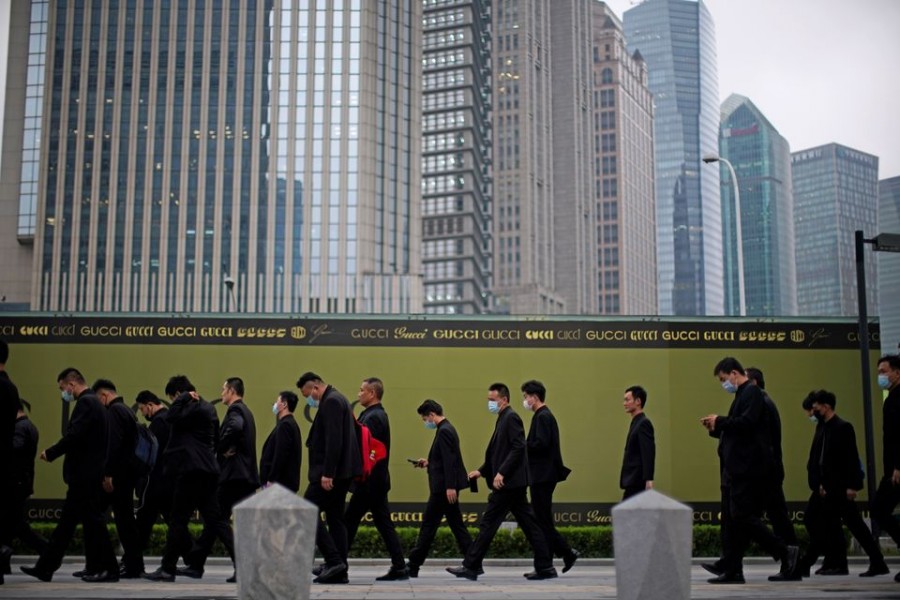China's economy hit its slowest pace of growth in a year in the third quarter, hurt by power shortages, supply chain bottlenecks and major wobbles in the property market and raising pressure on policymakers to do more to prop up the faltering recovery, reports Reuters.
Data released on Monday showed gross domestic product (GDP) grew 4.9 per cent in July-September from an earlier, the weakest clip since the third quarter of 2020 and missing forecasts.
The world's second-largest economy is facing several major challenges, including the China Evergrande Group debt crisis, ongoing supply chain delays and a critical electricity crunch, which sent factory output to its weakest since early 2020, when heavy Covid-19 curbs were in place.
"The domestic economic recovery is still unstable and uneven," said National Bureau of Statistics (NBS) spokesperson Fu Linghui at a briefing in Beijing on Monday.
China's economy had staged an impressive rebound from last year's pandemic slump thanks to effective virus containment and hot overseas demand for the country's manufactured goods. But the recovery has lost steam from the blistering 18.3 per cent growth clocked in the first quarter of this year.
"In response to the ugly growth numbers we expect in coming months, we think policymakers will take more steps to shore up growth, including ensuring ample liquidity in the interbank market, accelerating infrastructure development and relaxing some aspects of overall credit and real estate policies," said Louis Kuijs, head of Asia economics at Oxford Economics.
A Reuters poll of analysts had expected GDP to rise 5.2 per cent in the third quarter.
The weak numbers sent most Asian stock markets lower amid broader investor concerns about the global economic recovery.
Global worries about a possible spillover of credit risk from China's property sector into the broader economy have also intensified as major developer China Evergrande Group wrestles with more than $300 billion of debt.
Chinese leaders, fearful that a persistent property bubble could undermine the country's long-term ascent, are likely to maintain tough curbs on the sector even as the economy slows, but could soften some tactics as needed, policy sources and analysts said.
New Risks
New construction starts in September slumped for a sixth straight month, NBS data showed, the longest spate of monthly declines since 2015, as cash-strapped developers reined in investment and paused projects following tighter borrowing limits.
Meanwhile, the industrial sector has been hit by power rationing triggered by coal shortages, as well as environmental curbs on heavy polluters like steel plants and floods over the summer.
Overall industrial output rose just 3.1 per cent in September from a year earlier, marking the slowest growth since March 2020, during the first wave of the pandemic.
Aluminium output declined for the fifth consecutive month and daily crude steel output hit the lowest level since 2018.
Bucking the negative trend, retail sales grew 4.4 per cent, faster than forecasts and the 2.5 per cent growth in August, and the surveyed nationwide jobless rate fell from 5.1 per cent to 4.9 per cent.
"Most of the (negative) factors are policy-driven... the economy is having a lot of pain points and these pain points are not going away soon because policies are here to stay, and therefore it will continue into 2022," said Iris Pang, chief economist for Greater China at ING.
On a quarterly basis, growth eased to 0.2 per cent in July-September from a downwardly revised 1.2 per cent in the second quarter.
Premier Li Keqiang said on Thursday that China has ample tools to cope with economic challenges despite slowing growth, and expressed confidence in hitting full-year development goals.
On Sunday, People's Bank of China governor Yi Gang said the economy is expected to grow 8 per cent this year.
"At present, China's fiscal strength is continuously increasing, and there is still relatively big room for monetary policy," said the NBS's Fu.
Still, the central bank is expected to remain cautious about monetary easing due to worries about high debt and property risks.
Analysts polled by Reuters expect the People's Bank of China to refrain from attempts to stimulate the economy by reducing the amount of cash banks must hold in reserve until the first quarter of 2022.


